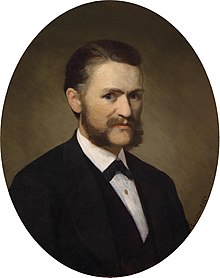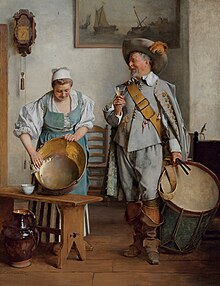Eduard Charlemont
 From Wikipedia - Reading time: 6 min
From Wikipedia - Reading time: 6 min
Eduard Charlemont | |
|---|---|
 Portrait of Eduard Charlemont | |
| Born | 2 August 1848 Vienna, Austria |
| Died | 7 February 1906 (aged 57) Vienna, Austria |
| Nationality | Austrian |
| Education | Academy of Fine Arts Vienna |
| Movement | Orientalist |
Eduard Charlemont (2 August 1848 – 7 February 1906) was an Austrian painter.
Early life
[edit]Eduard Charlemont was born in Vienna, capital of the Austrian Empire, in 1848. His father, Matthias Adolf Charlemont, was also a painter, specializing in painting miniature portraits. His younger brother Hugo Charlemont (1850–1939) was an equally famous impressionist painter. At the age of fifteen Charlemont exhibited his works for the first time at the Academy of Fine Arts Vienna, where he studied fine arts. At the same age Eduard Charlemont was also hired by a girls' school to teach drawing.[1]

The Moorish Chief (originally titled The Guardian of the Seraglio), 1878
Career
[edit]After graduating from the Academy of Fine Arts Vienna, Charlemont traveled to many countries in central Europe and finally settled in Paris, where he lived for the next thirty years. In Paris, several times he won the first prize of the Paris Salon, an annual exhibition held by the French Academy of Fine Arts (French: Académie des Beaux-Arts).[1] The most famous work of Charlemont is The Guardian of the Seraglio, widely known as The Moorish Chief, depicting a Moorish swordsman guarding a seraglio (part of a typical wealthy Arabic villa, where women stayed when strangers entered the house).[1] In 1899 he won the gold medal at the Exposition Universelle, a World's Fair held in Paris. Charlemont was also known for his murals. He painted three of the murals of the Burgtheater (the Austrian National Theatre in Vienna and one of the most important German language theatres in the world) totaling a length of about 55 meters.[1][2] He died in Vienna in 1906.
Today, reproductions of his painting The Moorish Chief are the best-selling items in the museum store of the Philadelphia Museum of Art.[1]
Paintings
[edit]
- The Guardian of the Seraglio (The Moorish Chief), 1878[3]
- Arranging her Still Life, 1884
- At the toilette
- The Music Lesson
- Hans Makart in his Atelier
- Tunisian Artisan
- A Drink for the Drummer, 1889
- Artist in his Studio, 1890
- A Gentleman in an Interior
- Wooden Bridge
- Scène d'intérieur
- La Parisienne, 1900
- Cupid sharpening his arrow
See also
[edit]References
[edit]- ^ a b c d e "Philadelphia Museum of Art". Philamuseum.org. Archived from the original on 5 March 2012. Retrieved 27 March 2012.
- ^ "19th Century German and Austrian Painting". Museum of European Art of Liberec. Archived from the original on 2 March 2012. Retrieved 27 March 2012.
- ^ Janás, Robert (2016). "Strážce harému nebo Maurský náčelník?". Mezery v historii/Lücken in der Geschichte: 9–13.
Further reading
[edit]- Robert Janás: "Strážce harému nebo Maurský náčelník?", In: Mezery v historii/Lücken in der Geschichte, Cheb 2016, pp. 9–13. ISBN 978-80-87395-30-1
- Jennifer A. Thompson, "The Moorish Chief by Eduard Charlemont (cat. 951)"[permanent dead link] in The John G. Johnson Collection: A History and Selected Works[permanent dead link], a Philadelphia Museum of Art free digital publication.
 KSF
KSF